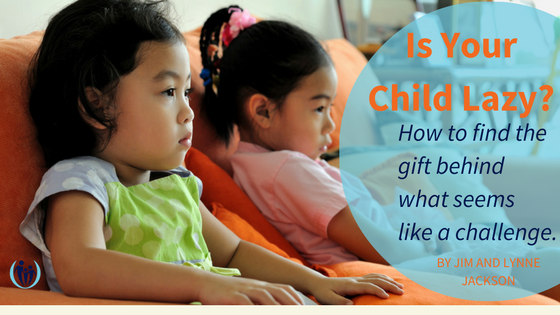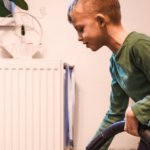
Is Your Child Lazy?
Lazy Child, Lazy Adult?
As parents, we hope to raise children that turn into productive, helpful adults, but the path to getting there can seem rough. Getting kids to do daily chores; like making their beds, helping with meals, or doing yard work can feel like an exercise in futility–or for sure an exercise in nagging. How can parents inspire kids to get up off the couch, away from a screen and ready and willing to tackle their chores? Connected Families believes that taking a different view of unwanted behaviors in kids is one of the first steps in helping your children grow into responsible, capable adults.
We often receive letters asking for parenting advice. Here’s one we just had to share about one family’s struggle with a “lazy” child. Read on to gain a new perspective on laziness.
Is There a Gift in Laziness?
Hello Jim and Lynne,
What is God’s gift in laziness? I have a youngest daughter that only does exactly what is asked and nothing more, even if it’s obvious there’s something else that needs to be done to complete the job. She also seems to go to the bathroom at inopportune times and makes herself scarce when there is work to be done. Please help me see the gift in my child.
Debbie
Redefining Laziness: Our Response
Debbie,
A starting place is to redefine the issue. “Laziness” carries a fairly strong negative judgment that your child is certain to sense from you. Being more specific about what’s happening – like task avoidance can make it easier to discern a gift-gone-awry.. A child’s gift-gone-awry for this issue might include a number of possibilities:
- relaxed personality
- doesn’t succumb to pressure from others
- not intimidated
- knows what’s important to her and what’s not
- not an anxious pleaser
- independent thinker
These are just possibilities – It helps to think through other situations as you consider these ideas. The question you can ask yourself is this: Do I see my child exhibiting these traits in other areas of her life?
Finding the Gift Gone Awry
A way to address this can simply be to say any of these things as an observation. Perhaps like this:
“You seem to really know what you want to do and what you don’t want to do.” Or, “You probably have this all figured out.”
Sometimes the things kids avoid doing are just things that don’t matter nearly as much to them as those things do to us. Sometimes kids have learned that their chores will get taken care of if they simply avoid them long enough. These are smart, energy conserving kids 😉
Looking at the Problem Through Another Lens
For example, we initially had an unhelpful judgment that our kids were “lazy” about cleaning their rooms. It turned out that what mattered to them was having clean clothes. We wanted them to clean them up for laundry day so they didn’t have to go to school in dirty clothes. If the kids left their clothes on the floor long enough, we’d finally pick up their clothes and wash them, because we didn’t want the embarrassment of having our kids out in public looking unkempt and uncared for. Essentially, we taught the kids that they would get clean clothes even if they didn’t pick them up.
Solutions for All
So we stopped doing that and just said, “You seem to have figured out a way to get your clothes cleaned without having to pick them up. We thought it was laziness, but we’ve figured out it’s pretty clever on your part. From now on, however, if you want us to clean your clothes, you’ll have to pick them up and have them in the bin so that whenever we collect clothes for the wash, yours will get collected. Otherwise, you’re on your own to launder your clothes. We believe you are responsible enough to get your clothes clean if you want clean clothes.” We were calm and affirming – optimistic that even if they didn’t respond right away the kids could learn to be responsible for their clothes one way or the other.
At first, they didn’t get their clothes cleaned. They also learned at about age 9 to do their own laundry. It turns out they weren’t lazy, but preferred different ways of getting their clothes clean than what we offered. They were ready to be independent. Sometimes they even wore dirty clothes to school – not because they were “lazy” but because it’s what they decided.
Judgments that Become Self-Fulfilling
What we came to realize in the quest to help our kids learn to take responsibility is that our judgments about them as “lazy” kids became self-fulfilling, and so did our new attitude that they were capable.
This could have gone a bunch of different ways, but the key to our kids’ change was less about our tactics, and more about our attitude. We changed from, “our kids are lazy” to “our kids can be responsible.” This attitude guided our tactics, but if the tactics hadn’t helped we would have found new ones based on our new attitude.
Hope this helps! Let us know if you keep feeling stuck.
Blessings,
Jim Jackson, President/Co-founder Connected Families
Next Steps
What about you, are you willing to view your child’s “faults” as burgeoning talents? How can you take key moments and turn them into opportunities to allow your child to grow and blossom? Laziness, like many of the issues that parents face, is not a sentence for your child if they are given the opportunity to take ownership over their own actions.
Sign up below to receive a weekly dose of encouragement straight to your inbox:







